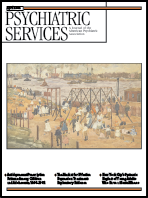Serving Deaf Adult Psychiatric Inpatients
Abstract
The unique treatment needs of psychiatric inpatients who are deaf require added dimensions to their care. Because of the scarcity of specialized units for persons who are deaf, descriptions of these treatment needs are infrequent. This study assessed diagnoses and linguistic and cognitive comorbidities in this population. A total of 62 percent of the inpatient sample had major mental illnesses, 58 percent had psychotic illnesses, and 26 percent had a dual diagnosis of a mental disorder and substance use disorder. Case examples illustrate some of the unique characteristics of these patients. The broad reasons for admission are illustrated, as are some of the treatment adaptations made by a specialized unit for deaf persons.



